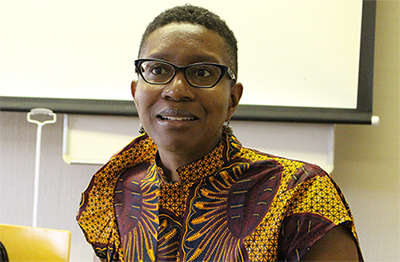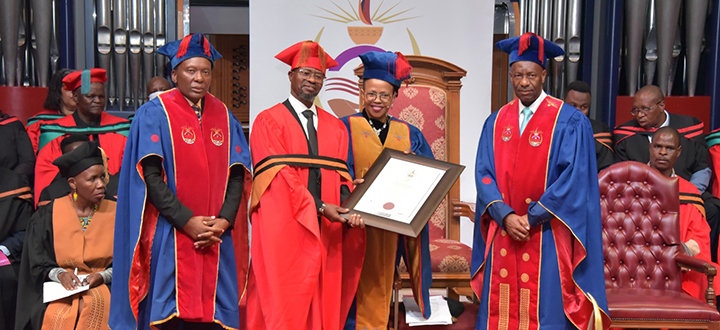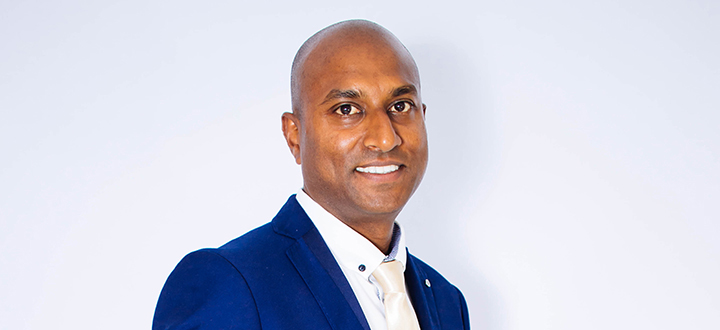College of Human Sciences
The cost of mothering political memory
 Visiting Professor, Tiffany Willoughby-Herard from the University of California, was hosted by Unisa’s Institute for Gender Studies for a 4-part lecture series. Her first lecture was entitled Black feminism: The Cost Mothering Political Memory. It was a reflection of the past, and shadows it still has in the present. The Institute for Gender Studies in the College of Human Sciences hosted this lecture series to create a platform to discuss black feminism and feminism globally.
Visiting Professor, Tiffany Willoughby-Herard from the University of California, was hosted by Unisa’s Institute for Gender Studies for a 4-part lecture series. Her first lecture was entitled Black feminism: The Cost Mothering Political Memory. It was a reflection of the past, and shadows it still has in the present. The Institute for Gender Studies in the College of Human Sciences hosted this lecture series to create a platform to discuss black feminism and feminism globally.
“Through countless women remembered by African fora, such as Black Lives Matter we come to understand the generalised ethos that links the surveillance of black female bodily changes and reproductive health under enslavement to the massive contemporary expansion in the medicalisation of policing black female bodies which is an entire discursive world sustained by grief and subjection,” she said.
She spoke about the violence against women by the same police who are supposed to be their protectors, and highlighted how a woman cannot dial 911 because there is no one to really call. Under such regimes of brute force, everything is within policy – the silence about these murderers in custody in addition to the murders themselves.
Professor Willoughby-Herard said that a significance of slave’s status passes through the line of the mother.“One way to understand what could happen to these women, has to do with this history that has been under studied of medical plantations and black women being figures of medical experimentations”.
Learning about the lives of these women enabled her to enter conversations about the way gendering or un-gendering preceded in plantation life. She said she found herself turning away from pain and black pain by pouring all her energy into activism and formal political organisational responses. However, in order to be a black woman professor who trains the next generation, she had to be willing to address the question of pain.
She quoted from the Anarcha Project: Sims and Medical Plantation: “So when Black people have diarrhea or diabetes or just plain amputations or get their teeth pulled out with forceps, they don’t really feel it. They just add it ono the rest of their experiences of slavery and rape so that they can have great survival stories. I am happy to hear they have a name for the affliction ‘Dysaesthesia Aethiopis’ – black people feel no pain.”
She read the above poem using Anarcha’s bucket as a prop to tell her story. She emphasised that carrying Anarcha’s bucket puts her and her body back into the history that best helps explain the contemporary epidemic of state and vigilante murder of black women. She added that it is important to talk about black women and their positionality in the world.
*By Nomshado Lubisi (CHS communications and marketing)
Publish date: 2018-05-02 00:00:00.0

 Young Unisa doctoral graduate joins elite Lindau Nobel Laureate group
Young Unisa doctoral graduate joins elite Lindau Nobel Laureate group
 Education MEC addresses Unisa autism seminar
Education MEC addresses Unisa autism seminar
 Seven Unisans nominated for the NSTF-South32 Awards 2023/2024
Seven Unisans nominated for the NSTF-South32 Awards 2023/2024
 Unisa awards posthumous honorary doctorate to literary maven, OK Matsepe
Unisa awards posthumous honorary doctorate to literary maven, OK Matsepe
 From humble beginnings to academic leadership
From humble beginnings to academic leadership